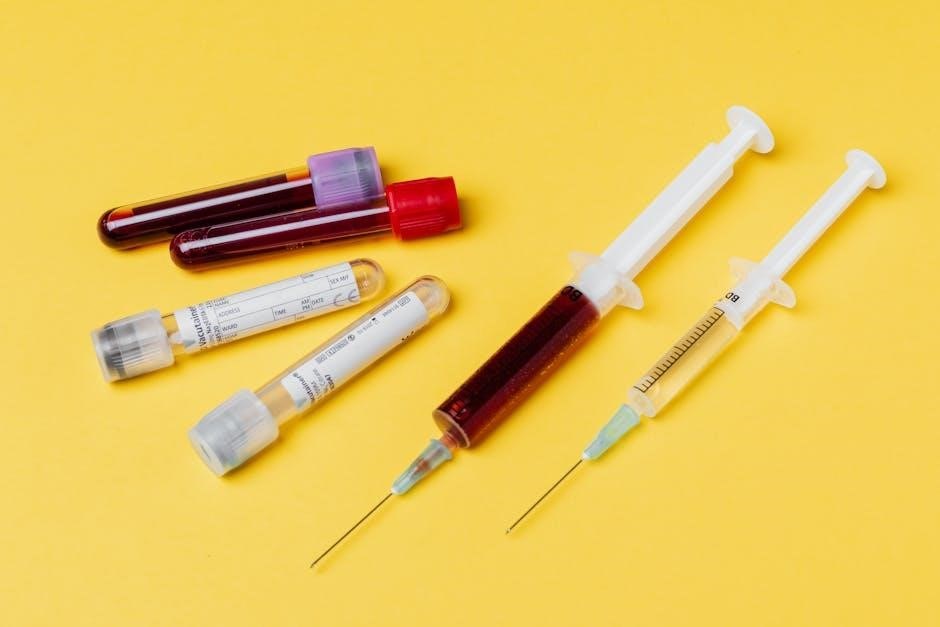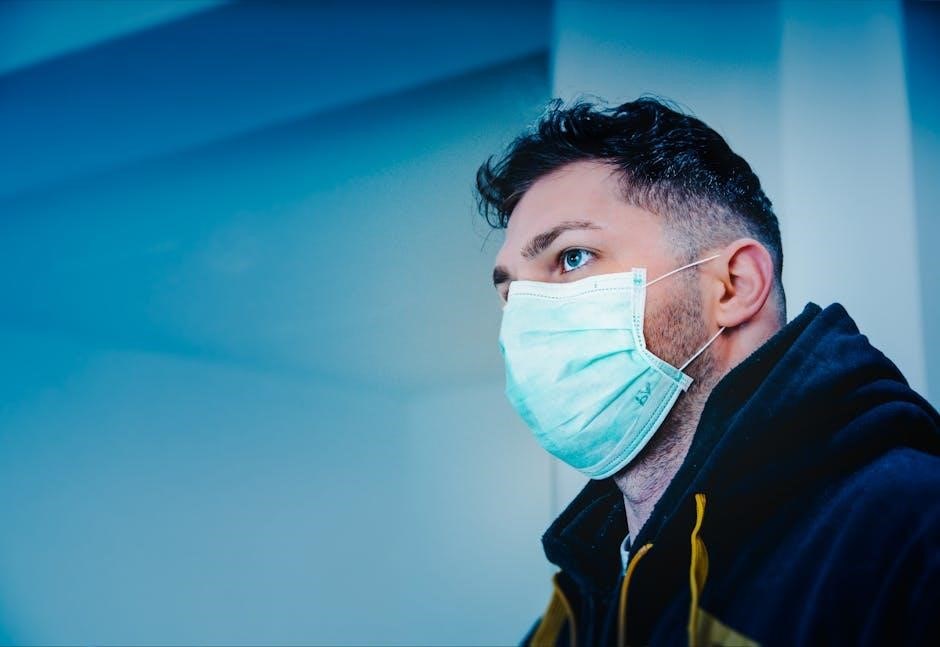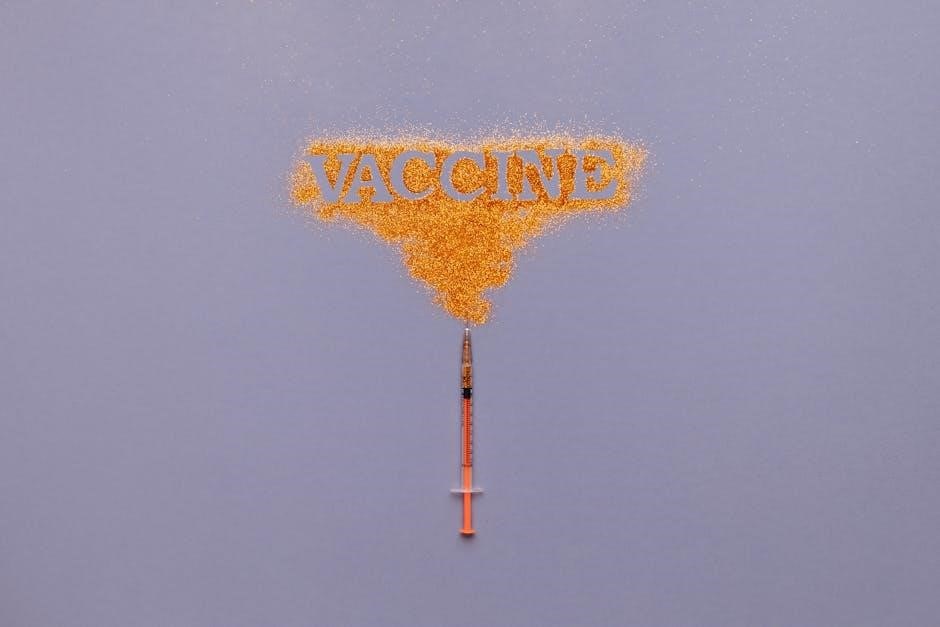Infection control is crucial for preventing the spread of infectious diseases in healthcare settings. Effective practices, including proper hand hygiene and use of PPE, safeguard patient and staff health. Regular training and adherence to guidelines ensure a safe environment, reducing infection risks and promoting public health. Understanding key principles through quizzes and questionnaires enhances knowledge and compliance, fostering a culture of safety and preparedness.
What is Infection Control?
Infection control refers to practices and protocols designed to prevent the spread of infectious diseases in healthcare settings. It involves measures like hand hygiene, use of personal protective equipment (PPE), and proper sterilization of equipment. These strategies aim to protect patients, staff, and visitors from acquiring or transmitting pathogens. Effective infection control is essential for maintaining a safe environment, reducing the risk of outbreaks, and ensuring the delivery of high-quality care. It is a critical component of public health and patient safety.
Why is Infection Control Important?
Infection control is vital for preventing the spread of infectious diseases in healthcare settings. It protects patients, staff, and visitors from acquiring or transmitting pathogens. Effective infection control minimizes the risk of outbreaks, reduces hospital-acquired infections, and promotes a culture of safety and accountability. By adhering to guidelines and regulations, healthcare facilities ensure evidence-based practices, safeguarding vulnerable populations and maintaining public trust. It is essential for delivering high-quality care and upholding ethical standards in patient safety and well-being.
Key Principles of Infection Control
Infection control relies on strategies like hand hygiene, use of PPE, and proper sterilization to prevent pathogen spread. Environmental cleaning and surveillance are also critical for effectiveness.
Hand Hygiene in Infection Prevention
Hand hygiene is a cornerstone of infection prevention, significantly reducing the spread of pathogens. Proper handwashing with soap and water or using alcohol-based hand rubs is essential. Healthcare workers should perform hand hygiene before patient contact, after removing PPE, and when hands are visibly soiled. Regular training and reminders are crucial to ensure compliance. Common mistakes include inadequate handwashing duration and neglecting areas like thumbs and fingertips. Consistent practice protects patients, staff, and the community from infections.
Use of Personal Protective Equipment (PPE)
Personal Protective Equipment (PPE) is essential for preventing the transmission of infectious agents in healthcare settings. PPE includes gloves, masks, gowns, and eye protection, each serving specific purposes. Proper use of PPE involves correct donning and doffing techniques to avoid contamination. Training on PPE usage is critical to ensure compliance with infection control guidelines. Adherence to PPE protocols minimizes exposure risks for healthcare workers and protects patients from potential infections, making it a vital component of infection prevention strategies.

Dedicated Infection Prevention and Control (IPC) Programs
Dedicated IPC programs are essential for minimizing infection outbreaks in healthcare settings. They include guidelines, staff training, and monitoring to ensure effective infection control practices are consistently applied.
Role of IPC Programs in Hospitals and Clinics
IPC programs play a vital role in minimizing infection outbreaks and ensuring patient safety. They monitor infection trends, implement preventive measures, and train staff on best practices. These programs also facilitate compliance with infection control guidelines, reducing the risk of disease transmission. Regular audits and feedback loops help improve adherence to protocols, ensuring a safer environment for both patients and healthcare workers.
Implementation of IPC Recommendations
Successful implementation of IPC recommendations requires a structured approach. Healthcare facilities must assess infection risks, develop tailored strategies, and ensure staff training. Continuous monitoring and feedback mechanisms are essential to maintain compliance. Regular reviews of IPC practices help identify gaps and improve outcomes. By prioritizing these steps, healthcare settings can effectively reduce infection transmission, ensuring a safer environment for patients, visitors, and staff.

Core Competencies in Infection Control
Core competencies in infection control encompass essential knowledge, skills, and attitudes for professionals to effectively prevent infections, ensuring patient and staff safety through evidence-based practices.
Knowledge Required for IPC Professionals
IPC professionals must possess comprehensive knowledge of infection prevention guidelines, including pathogen transmission, risk assessment, and control measures. They need to understand proper hand hygiene, PPE use, and environmental cleaning practices. Familiarity with local and international IPC standards, as well as legal regulations, is essential. Knowledge of surveillance methods and outbreak management is critical to identifying and mitigating infection risks. Staying updated on emerging pathogens and evidence-based practices ensures effective IPC strategies and patient safety.
Skills and Attitudes for Effective IPC Practice
Effective IPC practice requires strong observational and analytical skills to identify infection risks and implement controls. Professionals must be detail-oriented, able to interpret data, and skilled in training others. Collaboration with healthcare teams is essential for consistent IPC implementation. A proactive attitude toward learning and adapting to new guidelines is crucial. Empathy and clear communication skills help in addressing patient and staff concerns, fostering a culture of safety and accountability in infection prevention efforts.
Environmental Hygiene in Infection Control
Environmental hygiene is critical in infection control, involving proper cleaning and disinfection to eliminate pathogens and reduce infection risks.
Assessing Environmental Hygiene Risks
Assessing environmental hygiene risks involves identifying potential contamination sources and evaluating cleaning effectiveness. Regular audits ensure adherence to infection control standards, minimizing infection spread risks.
Best Practices for Maintaining a Clean Environment
Maintaining a clean environment requires consistent disinfection of high-touch areas, proper waste disposal, and regular cleaning schedules. Training staff on hygiene protocols ensures compliance with infection control standards, reducing contamination risks and promoting a safe healthcare setting.

Infection Control Quizzes and Questionnaires
Infection control quizzes and questionnaires are essential tools for assessing knowledge and awareness. They include true/false questions, multiple-choice, and case studies, often used during IPC Week activities with prizes to encourage participation.
Designing Effective Questionnaires for Staff
Effective questionnaires for staff should assess knowledge, attitudes, and practices in infection control. Use a mix of true/false, multiple-choice, and scenario-based questions to engage participants. Ensure clarity and relevance to daily tasks, focusing on key IPC topics like hand hygiene and PPE use. Include incentives, such as prizes, to encourage participation. Regular reviews by IPC professionals can help refine questions and ensure accuracy. Such tools are invaluable for identifying training needs and improving compliance with IPC guidelines.
True or False Questions for IPC Awareness
True or false questions are an effective way to assess IPC awareness among staff. They should cover essential topics like hand hygiene, PPE use, and environmental cleaning. For example, “True or False: Hand hygiene should be performed before and after patient contact.” Such questions enhance knowledge retention and ensure compliance with IPC guidelines. Regular quizzes can identify gaps in understanding and reinforce critical infection control practices; They also encourage active participation and continuous learning in healthcare settings.
Airborne Precautions in Infection Control
Airborne precautions are necessary for pathogens like tuberculosis that remain suspended in air. Key measures include respiratory protection and isolation in negative-pressure rooms to prevent transmission.
Pathogens Requiring Airborne Precautions
Pathogens such as tuberculosis, measles, and chickenpox require airborne precautions. These microorganisms remain suspended in the air for extended periods, increasing the risk of transmission. Proper respiratory protection and isolation in negative-pressure rooms are critical to prevent spread. Understanding the specific pathogens that necessitate these measures is essential for effective infection control strategies in healthcare settings. Regular training ensures staff can identify and manage such cases appropriately, safeguarding both patients and personnel. This approach minimizes the risk of airborne disease transmission.
Proper Use of Respiratory Protection
Proper use of respiratory protection is critical for preventing airborne pathogen transmission. Healthcare workers must wear N95 respirators or higher when caring for patients with airborne infections. Ensure proper fit through fit-testing and seal checks. Masks should cover the nose and mouth snugly, with no air leaks. Remove respirators correctly to avoid contamination. Training and adherence to guidelines are essential to maximize protection and minimize infection risk in high-risk settings. Proper techniques ensure safety and effectiveness in infection control practices.
Legal and Ethical Aspects of Infection Control
Infection control is governed by regulations ensuring compliance with safety standards. Ethical considerations emphasize patient confidentiality and the duty to protect both patients and healthcare workers effectively.
Regulations Governing IPC Practices
Regulations for infection prevention and control (IPC) are established to ensure adherence to evidence-based practices. Guidelines from organizations like the CDC and WHO outline standards for hand hygiene, PPE use, and environmental cleaning. Compliance with these regulations is mandatory for healthcare facilities to minimize infection risks. Regular audits and training programs are required to maintain adherence. Non-compliance can result in legal consequences, emphasizing the importance of strict enforcement. These regulations are continuously updated to address emerging pathogens and ensure patient safety.
Ethical Considerations in IPC Decision-Making
Ethical considerations in infection prevention and control (IPC) involve balancing patient safety, privacy, and dignity. Decisions must minimize harm, respect autonomy, and ensure justice in resource allocation. IPC professionals face dilemmas, such as isolating patients or disclosing risks, requiring careful ethical reasoning. Transparency in communication and fairness in policies are essential. Ethical frameworks guide actions, ensuring that IPC practices uphold trust and protect vulnerable populations while maintaining confidentiality and human rights in healthcare settings.

Case Studies in Infection Control
Real-World Examples of IPC Success
Successful IPC programs have significantly reduced infection rates in hospitals through rigorous hand hygiene, proper PPE use, and staff training, ensuring safer patient care environments always.
IPC programs have demonstrated significant reductions in healthcare-associated infections by implementing evidence-based practices. For instance, hospitals achieving high hand hygiene compliance saw a notable decrease in MRSA and C. difficile cases. Proper use of PPE and enhanced environmental cleaning protocols further contributed to these successes. Successful IPC initiatives often involve multidisciplinary teams, continuous staff training, and robust monitoring systems to ensure sustainability. These real-world examples highlight the transformative impact of effective infection control strategies in safeguarding patient and staff safety.
Lessons Learned from IPC Failures
Failures in infection control often stem from lapses in basic protocols, such as inconsistent hand hygiene or improper PPE use. Communication gaps and inadequate training exacerbate risks. Outbreaks highlight the need for robust monitoring systems and rapid response mechanisms. Equipment shortages and lack of adherence to guidelines further compromise safety. These failures underscore the importance of continuous improvement, staff accountability, and systematic reviews to identify and address vulnerabilities, ensuring safer practices and better outcomes in healthcare settings.
Infection control remains vital for safeguarding public health and preventing infectious disease spread. Continuous learning and adherence to guidelines are essential for future advancements in IPC practices.
Reinforcing the Importance of Infection Control
Effective infection control practices are foundational in healthcare settings to prevent the spread of infectious diseases. They protect patients, staff, and visitors while maintaining public health safety. Regular education and training on IPC guidelines ensure healthcare workers understand and apply these practices. Ongoing efforts to reinforce infection control principles through quizzes, questionnaires, and specialized training empower staff to make informed decisions, fostering a culture of safety and accountability in all healthcare environments.
Future Directions in IPC Practices
Future IPC practices will focus on advancing technology, enhancing surveillance, and promoting standardized protocols. Integration of AI and data analytics will improve infection tracking and prevention strategies. Continuous education and training programs will ensure healthcare workers stay updated on best practices. Emphasizing sustainability in infection control measures will reduce environmental impact while maintaining safety. Collaboration between healthcare facilities and public health organizations will strengthen global IPC efforts, ensuring preparedness for emerging pathogens and fostering a safer healthcare environment for all.
